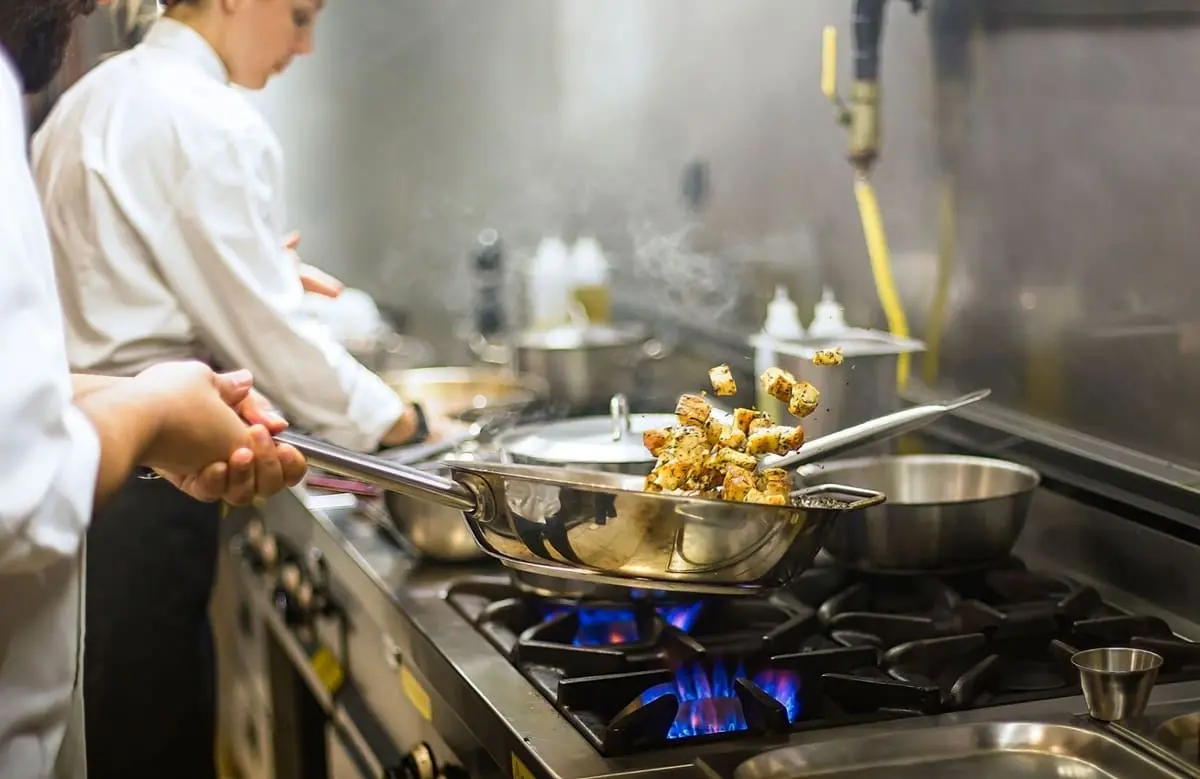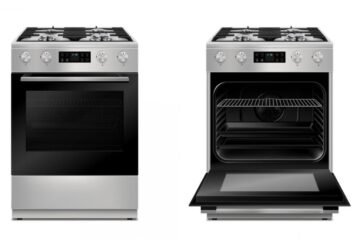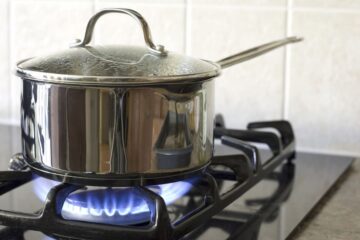Cooking is an art that requires precision, technique, and the right tools to achieve the perfect dish. The stove is arguably the most important among the many tools available to a chef. While electric stoves have been around for many years, gas stoves remain the preferred choice for many chefs. But have you ever wondered why do chefs like gas stoves?
In this blog post, we discuss the secret ingredient that makes gas stoves the go-to choice for chefs worldwide. From the speed of heat-up time to the level of control over the flame, we will delve into the many advantages of gas stoves over electric stoves. We will also explore the scientific reasons why gas stoves are favored in professional kitchens and how they can enhance the flavor and texture of your food.
So, whether you’re an amateur cook looking to up your game or a professional chef wanting to explore the advantages of gas stoves, this article will reveal the secret ingredient that makes gas stoves the preferred choice for cooking up a storm in the kitchen.
What To Know About Gas Stoves?
Gas stoves are kitchen appliances that use natural gas or propane to produce heat for cooking. Here are a few things to know about gas stoves:
- Gas stoves use natural gas or propane as a fuel source.
- They are typically more energy-efficient and provide better temperature control than electric stoves.
- Gas stoves require a gas line connection, which can be more expensive to install than an electrical connection.
- Gas stoves require regular cleaning and maintenance to ensure safety and efficiency.
- When using a gas stove, it is essential to be mindful of the potential for gas leaks and to have a carbon monoxide detector installed.
Cooking With Gas Vs Electric
When it comes to cooking, one of the most fundamental choices you’ll face is using gas or electricity. Here are some of the differences between cooking with gas and electric:
- Heat Control: Gas stoves offer more precise heat control than electric stoves. You can quickly adjust the heat with a gas stove by turning the flame up or down. Electric stoves, on the other hand, take a little longer to adjust and may respond slowly to changes in temperature.
- Cooking Speed: Gas stoves typically heat up faster than electric stoves, which can be advantageous if you’re trying to quickly get dinner on the table. Gas stoves also tend to cool down faster than electric stoves, which can be helpful if you need to reduce the heat quickly.
- Energy Efficiency: Electric stoves tend to be more energy-efficient than gas stoves. This is because electric stoves transfer more of their heat directly to the cookware, while gas stoves lose some heat to the surrounding air.
- Safety: Electric stoves are generally considered safer than gas stoves because they don’t emit any flammable gases. However, electric stoves can still pose a burn hazard if they get too hot.
- Maintenance: Gas stoves require more maintenance than electric stoves, as they have more parts that can wear out or break. Electric stoves are generally easier to clean and maintain.
Why Do Chefs Like Gas Stoves?
Chefs have a variety of preferences when it comes to cooking equipment. Still, gas stoves are a popular choice among many professional cooks. There are several reasons why chefs prefer gas stoves over electric or other types of stoves.
1. Better Temperature Control:
One of the main reasons why chefs prefer gas stoves is the ability to control the temperature. Gas stoves heat up quickly and can be adjusted to different heat levels, allowing for precise cooking. Unlike electric stoves, where the heat takes time to adjust, gas stoves instantly respond to changes in temperature, making them ideal for cooking dishes that require precise and consistent temperature control.
2. Even Heat Distribution:
Gas stoves also provide even heat distribution, which is important for cooking food evenly. Electric stoves tend to create hot spots, resulting in uneven cooking. With gas stoves, the flames spread evenly across the bottom of the cookware, ensuring that food is cooked evenly.
3. Visual Cue:
Another advantage of gas stoves is the visual cue they provide. The flames on a gas stove allow chefs to see the intensity of the heat and make adjustments accordingly. This visual cue is particularly helpful when searing meat or sautéing vegetables. Chefs can see when the pan is hot enough to cook the food without relying on a temperature gauge.
4. Immediate Heat:
Gas stoves also offer direct heat, which benefits chefs who need to cook quickly. The flames on a gas stove heat up quickly and are ready to use as soon as the stove is turned on. This direct heat can be helpful when searing meat, sautéing vegetables, or boiling water.
5. Versatile:
Gas stoves are also versatile and can be used for various cooking techniques. They can be used for high-heat cooking methods like searing and low-heat cooking methods like simmering. Gas stoves are also ideal for cooking with a wok or other cookware requiring direct heat.
6. Easy to Clean:
Finally, gas stoves are relatively easy to clean. Unlike electric stoves, gas stoves do not have heating coils or burners that can become caked with food debris. The grates on gas stoves can be removed and washed in the sink, making them easy to clean.
Tips For Cooking On A Gas Stove
Cooking on a gas stove can be a bit different than cooking on an electric stove, but with a little practice and these tips, you can become a pro in no time:
- Use the correct cookware: Choose a flat and even base, as this will help distribute heat evenly. Avoid using warped or bent pots and pans, which can cause uneven cooking.
- Control the flame: Gas stoves offer greater temperature control than electric stoves, so paying attention to the flame is essential. If the flame is too high, your food may burn; if it’s too low, it may not cook evenly.
- Preheat your cookware: Before cooking, preheat your cookware on the stove for a few minutes. This will help to distribute the heat and prevent hotspots evenly.
- Use a lighter or match: If your gas stove doesn’t have automatic ignition, you need a lighter or match to light the burner. Follow the manufacturer’s instructions and use caution when lighting the flame.
- Use a timer: Gas stoves heat up quickly, so it’s easy to overcook your food. Use a timer to keep track of cooking times and prevent your food from burning.
- Adjust the flame for different types of cooking:
- For simmering, use a low flame.
- For boiling or frying, use a high flame.
- For sautéing or stir-frying, use a medium flame.
- Keep the burners clean: Clean your burners regularly to prevent debris from blocking the flames and causing uneven cooking.
- Turn off the burner before removing the cookware: Always turn off the burner before removing your cookware from the stove. This will prevent accidental burns and fires.
Tips for Choosing a Gas Stove for Your Kitchen
1. Consider the size and layout of your kitchen:
The size and layout of your kitchen will determine the size of the gas stove you can install. Make sure to measure the space where the stove will be placed to ensure it will fit comfortably and leave enough space for ventilation.
2. Look for safety features:
Safety is essential for gas stoves, so look for features such as an automatic shut-off valve, a flame failure device, and a child safety lock.
3. Check the BTU rating:
The BTU (British Thermal Unit) rating measures the heating power of the gas stove. A higher BTU rating means the stove can heat up and cook food faster. However, a high BTU rating also means the stove uses more gas and may require more ventilation.
4. Consider the brand and quality of the stove:
Choose a reputable brand with a good reputation for quality and durability. You may pay more upfront for a high-quality stove, but it will likely last longer and require fewer repairs in the long run.
5. Decide on the type of gas stove:
There are two types of gas stoves: freestanding and slide-in. Freestanding stoves are self-contained and can be installed anywhere in the kitchen. In contrast, slide-in stoves are designed to fit between two countertops.
6. Determine your cooking needs and preferences:
Consider how often you cook, the types of dishes you make, and your cooking preferences. This will help you choose a gas stove with the right features and cooking options.
7. Consider the style and design of the stove:
Gas stoves come in various styles and designs, from traditional to modern. Choose a style that complements your kitchen décor and personal taste.
8. Look for additional features and options:
These stoves can have additional features such as a built-in grill, a convection oven, or a warming drawer. Consider which features are important to you and will enhance your cooking experience.
9. Consider your budget and the long-term cost of ownership:
Gas stoves can vary widely in price, so choosing one that fits your budget is important. However, consider the long-term ownership cost, including maintenance, repairs, and energy usage. A more expensive, high-quality stove may be more cost-effective in the long run.
- Cost To Convert A Natural Gas Stove To Propane (How To Calculate)
- What Number Is Simmer On A Gas Stove? (Right Information)
Why Don’t Chefs Like Electric Stoves?
Some chefs prefer gas stoves over electric stoves because they provide more precise temperature control and instant heat adjustments. With a gas stove, chefs can quickly turn the heat up or down, allowing them to cook food more evenly and with more control. Electric stoves, on the other hand, often delay heat adjustment and can be less responsive to changes in temperature.
Another reason chefs may prefer something other than electric stoves is that they often have a smooth, flat cooking surface, making it challenging to cook with certain types of cookware. With their open flames and grates, gas stoves allow for more flexibility in the types of pots and pans that can be used.
That being said, some chefs prefer electric stoves for certain types of cooking, such as baking or cooking delicate sauces, as they provide a more even and consistent heat source.
Do Bakers Prefer Gas Or Electric Ovens?
There is no one-size-fits-all answer to whether bakers prefer gas or electric ovens, as it ultimately depends on the individual baker’s preferences and the specific baking needs of their recipes. Both gas and electric ovens have their unique advantages and disadvantages.
Some bakers prefer gas ovens as they provide moist heat, which is particularly beneficial when baking bread or pastries. The moist environment helps prevent the crust from becoming too dry or stiff. Additionally, gas ovens tend to heat up more quickly than electric ovens, which can be helpful when time is a factor.
On the other hand, electric ovens are preferred by other bakers as they provide more consistent heat, which can be important when baking delicate items like cakes and soufflés. Electric ovens also tend to have more precise temperature control, which can be helpful when following recipes that require specific baking temperatures.
So, the choice between a gas or electric oven will depend on the individual baker’s preferences and the specific needs of their recipes. Some bakers prefer to have both types of ovens available to them so that they can choose which one to use based on the specific recipe they are baking.
Do Restaurants Use Gas Or Electric Ovens?
Restaurants can use gas and electric ovens depending on their needs and preferences. However, electric ovens have become more prevalent in commercial kitchens in recent years due to several advantages over gas ovens.
Electric ovens are more energy-efficient than gas ovens, converting almost all their electricity into heat. In contrast, gas ovens can lose some of the heat through their exhaust system. Electric ovens also provide more consistent heat, essential for baking and roasting, as they have better temperature control and distribution. Electric ovens also do not emit harmful fumes or gases, making them a safer choice for commercial kitchens.
Do Home Buyers Prefer Gas Or Electric Stoves?
While there may be individual preferences among home buyers, gas stoves are generally considered the preferred choice over electric stoves. This is because gas stoves provide more precise temperature control and faster heating than electric stoves, making them more convenient for cooking. Additionally, many professional chefs and serious home cooks prefer gas stoves for their responsiveness and ability to produce high heat.
However, there are also benefits to electric stoves. For example, they are often considered safer than gas stoves since there is no risk of gas leaks or explosions. Also, electric stoves are typically easier to clean and maintain. If equipped with induction cooking technology, they can be more energy-efficient than gas stoves.
Bottom Line
In conclusion, gas stoves have been the go-to choice for professional chefs for decades due to their precise temperature control, instant heat, and versatility. These factors enable chefs to create delicious and consistent dishes every time they cook. Gas stoves also offer a level of safety that other cooking methods cannot match.
Although electric and induction cooktops have benefits, they cannot replicate the cooking experience gas stoves provide. Whether a professional chef or a home cook, investing in a gas stove can elevate your cooking game and provide you with the secret ingredient for culinary success.




